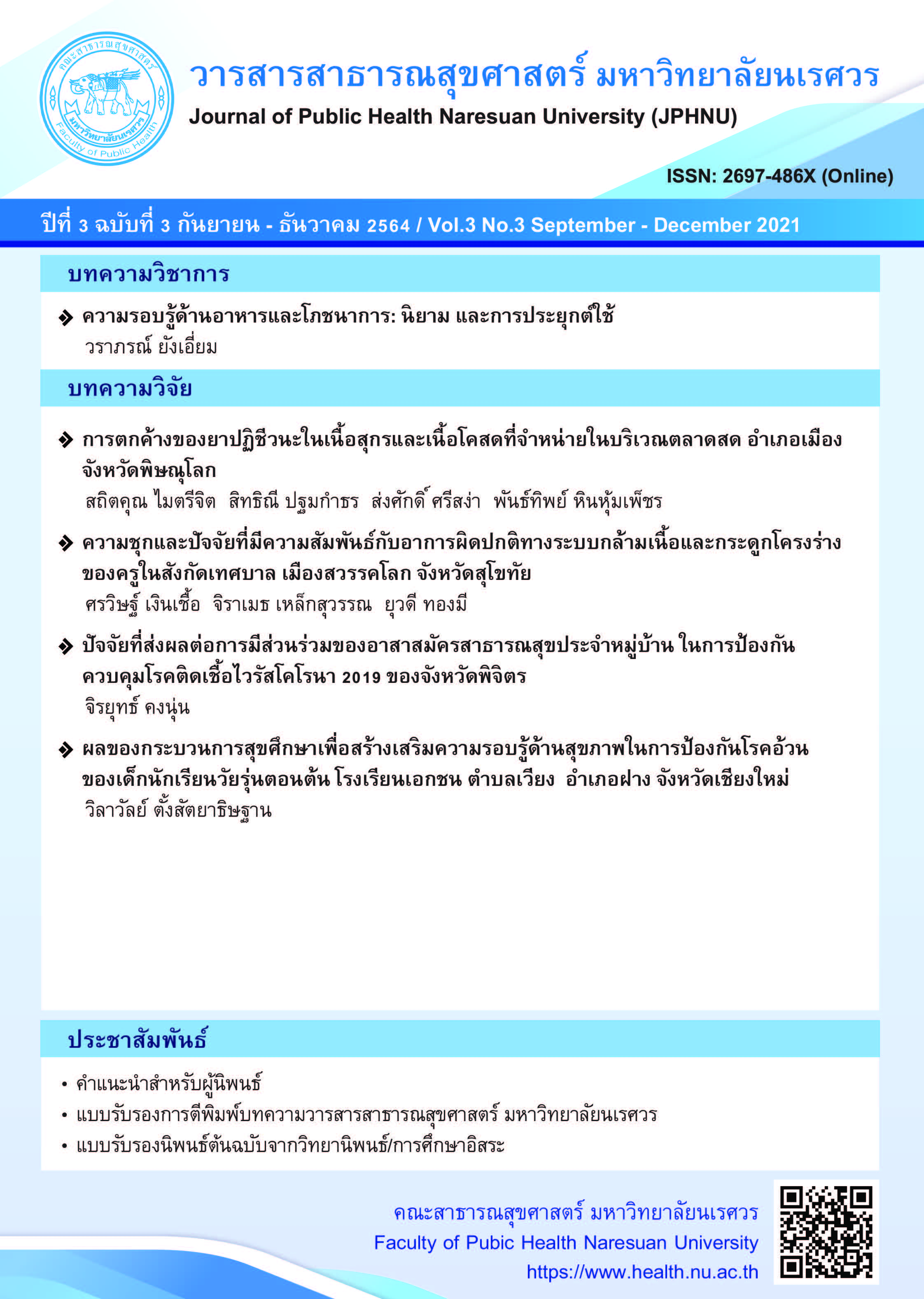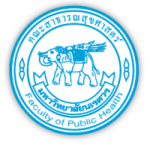The effects of health education process that enhance health literacy for obesity prevention among the early adolescents in private schools, Wiang Sub-district, Fang District, Chiang Mai Province
Keywords:
Health literacy, Obesity, Early adolescent, Health educationAbstract
This quasi-experimental research aimed to study the effect of health education processes to enhance health literacy in the prevention of obesity among early adolescents in a private school. The participants were 60 students from the Office of the Private Education Commission, Fang District, Chiang Mai, Thailand. The study subjects were divided equally into experimental and control groups. The experimental group obtained a health education process to enhance health literacy in the prevention of obesity among early adolescents for 5 sessions, 50 minutes each time, with a period of 2 weeks. The control group obtained health education following the usual guidelines of the Bureau of Nutrition. The data collecting tool was the measure of the health education process for enhancing health literacy in the prevention of obesity, which was applied before and after the experiment including in the follow-up period.
The results were analyzed using the Multivariate Analysis of Variance (MANOVA) and repeated measures MANOVA. The results showed that: 1) The experimental group, after attending the health education process, at the post and follow up period, had higher levels of average health literacy scores in the prevention and control of obesity, and eating behavior as well as physical activity than the control group, with a statistical significance of 0.05. 2) The level of health literacy in the prevention of obesity and eating behavior as well as physical activity in the early adolescents in the experimental group, at the post and follow up periods, were higher than that of the pretest, with a statistical significance of 0.05
References
Chenglai, N., Prampate, C., & Ponsung, S. (2021). Development of health literacy model of overweight students using the artificial intelligence activities and social network in Trang Province. Journal of Sakon Nakhon Hospital, 24(1), 11-22. (in Thai)
Chuaysrinuan, J., Chaimay, B., & Woradet, S. (2020). Factors associated with health literacy towards obesity prevention among primary school students in Cha-Uat District, Nakhon Si Thammarat Province. Journal of community public health, 6(1), 23-35. (in Thai)
Chutipattana, N., Sripitak, T., & Thongsamsi, I. (2019). Relationship between health literacy and overweight and obesity among adolescent students in Yala Province. Thai Pharmaceutical and Health Science Journal, 15(2), 98-105.
Coates, M. M., Kintu, A., Gupta, N., Wroe, E. B., Adler, A. J., Kwan, G. F. et al. (2020). Burden of non-communicable diseases from infectious causes in 2017: A modelling study. The Lancet Global Health, 8(12), e1489-e1498.
Fang Hospital. (2020). Annual performance report 2020. Chiang Mai: Fang Hospital. (in Thai)
Fleary, S. A., & Joseph, P. (2020). Adolescents' health literacy and decision-making: A qualitative study. American journal of health behavior, 44(4), 392-408.
Fleary, S. A., Joseph, P., & Pappagianopoulos, J. E. (2018). Adolescent health literacy and health behaviors: A systematic review. Journal of adolescence, 62, 116-127.
Folkvord, F., Anschutz, D. J., Boyland, E., Kelly, B., & Buijzen, M. (2016). Food advertising and eating behavior in children. Current Opinion in Behavioral Sciences, 9, 26-31.
Isasi, C., & Wills, T. (2011). Behavioral self-regulation and weight-related behaviors in inner-city adolescents: A model of direct and indirect effects. Childhood obesity, 7(4), 306-315.
Janchai, N., Deoisres, W., & Chaimongkol, N. (2021). A improving health literacy using the health education and health empowerment program in Thai adults with uncontrolled hypertension: A randomized controlled trial. Pacific Rim International Journal of Nursing Research, 25(4), 600-613.
Javier Jr, R., Tiongco, M., & Jabar, M. (2019). How health literate are the iGeneration Filipinos? Health literacy among Filipinos early adolescents in middle schools. Asia-Pacific Social Science Review, 19(3), 16-19.
Lamid, P., Pongkaset, A., & Chainapong, K. (2021). Health literacy and influence of interpersonal relations towards food consumption behavior to prevent obesity among grade 6 students in Municipality school, Yala Municipality. Academic Journal of Community Public Health, 7(1), 35-35. (in Thai)
Maneedang, P. (2017). The role of community health nurse in obesity prevention of school children. Journal of Nursing and Health Care, 35(4), 16-24. (in Thai)
Minghelli, B. (2018). The importance of improving health literacy in schools. EC Orthopaedics, 9, 7-10.
Munsraket, R. (2020). Health promotion of school-age children with obesity to reduce risks of diabetes in school. Regional Health Promotion Center 9 Journal, 14(35), 437-449. (in Thai)
Nudla, P., Jittanoon, P., & Balthip, K. (2016). The development of internet-based dietary self-monitoring program for overnutrition adolescents. Songklanagarind Journal of Nursing, 36(4), 70-84.
Nutbeam, D., McGill, B., & Premkumar, P. (2018). Improving health literacy in community populations: A review of progress. Health promotion international, 33(5), 901-911.
Pine, A., Barch, D. M., Luby, J., & Whalen, D. J. (2020). Emotion identification in preschool and early adolescent body mass index: exploring the roles of depressive symptoms and peer relations. Child Psychiatry & Human Development, 51(2), 321-329.
Raksachon, J., & Manawiroj, S. (2020). Promoting over nutrition management of primary school students in schools under the Nonthaburi Municipality Nonthaburi Province. Journal of Humanities and Social Sciences, Rajapruk University, 6(1), 174-185. (in Thai)
Ruangying, J., Jorajit, S., & Janyam, K. (2016). Food consumption behavior of adolescents in Songkhla Province: Synthesis of literacy and factors influencing food consumption behavior. Journal of Liberal Arts Prince of Songkla University, 8(1), 245-264. (in Thai)
Saeloo, J., & Wiriyasirikul, N. (2020). The relationship between health literacy and obesity prevention behaviors of school age children with overweight and obesity in schools under Primary Educational Service Area Office Mueang District, Nakhon Si Thammarat Province. Journal of MCU Nakhondhat, 7(11), 1-15. (in Thai)
Sanont, R., & Harnkiattiwong, T. (2020). Application of social cognitive theory to explain health behavior. Journal of Humanities and Social Sciences Loei Rajabhat University, 3(1), 12-22. (in Thai)
Singtong, T., Ivanovitch, K., & Boonshuyar, C. (2020). Effects of a nutrition literacy promotion program on eating behavior of secondary school students. Thai Journal of Public Health, 50(2), 148-160. (in Thai)
Somkhanngern, J., & Jumpa, P. (2021). Health promotion in obese student. Journal of Research and Development Institute Rajabhat Maha Sarakham University, 8(2), 101-116. (in Thai)
Svendsen, M. T., Bak, C. K., Sorensen, K., Pelikan, J., Riddersholm, S. J., Skals, R. K. et al. (2020). Associations of health literacy with socioeconomic position, health risk behavior, and health status: A large national population-based survey among Danish adults. BMC Public Health, 20(1), 1-12. doi:10.1186/s12889-020-08498-8.
Teixeira, P., Mata, J., Williams, G., Gorin, A., & Lemieux, S. (2012). Self-regulation, motivation, and psychosocial factors in weight management. Journal of Obesity, 2012. doi:10.1155/2012/582348
Tuntiakarat, S., & Khuneepong, A. (2017). Factors associated with the overweight of primary students in public school. Journal of Preventive Medicine Association of Thailand, 7(3), 272-279. (in Thai)
World Health Organization. (2018). Taking action on childhood obesity report. London: World Obesity Federation. Retrived June 18, 2018, from https://www. who.int/end-childhoodobesity/publications/taking-actionchildhood-obesity.
Downloads
Published
How to Cite
Issue
Section
License
The published article is copyrighted by the Journal of Public Health and Health Sciences Research.
The statements that appear in each article in this academic and research journal are the personal opinions of each author and are not related to Naresuan University and other faculty members in the university. Responsibilities regarding each article are the responsibility of each author.






